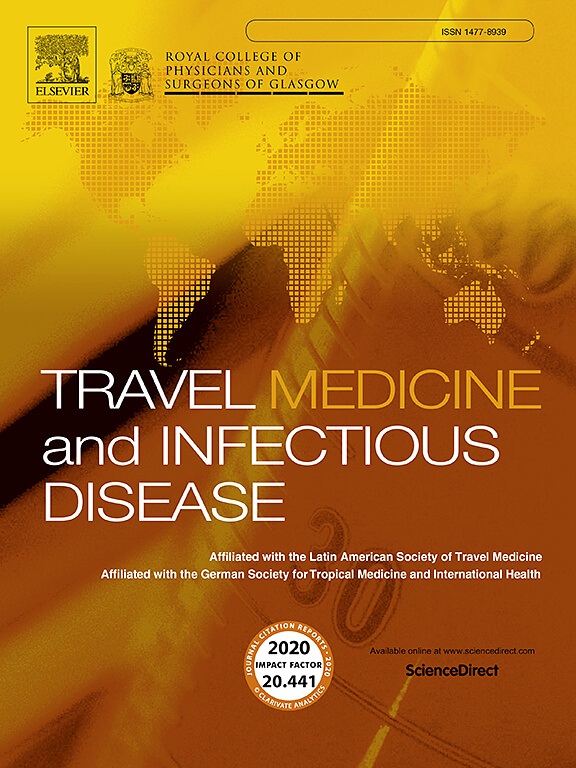Em-cfDNA微滴数字PCR检测在肝肺泡包虫病诊断中的临床应用价值。
IF 4.7
3区 医学
Q1 INFECTIOUS DISEASES
引用次数: 0
摘要
背景:肺泡棘球蚴病(AE)是一种由多房棘球蚴(E. multilocularis)引起的寄生虫病,主要影响肝脏,并有可能扩散到其他器官,具有很强的侵袭性。这种疾病在全球范围内受到越来越多的关注。本研究旨在通过检测血浆,评价液滴数字聚合酶链反应(ddPCR)技术在肝肺泡棘球蚴病(HAE)诊断中的临床价值,并探讨ddPCR定量结果与病变大小、分期的关系。方法:研究人员采集了57例确诊HAE患者的血液样本和34例无AE个体的对照样本。随后,利用ddPCR检测血浆中多房绦虫循环游离DNA (Em-cfDNA)。此外,下一代测序(NGS)和抗体检测作为比较方法。结果:ddPCR检测的灵敏度为91.22%,特异性为100%,优于常规血清抗体检测的灵敏度为89.50%,特异性为85.3%。ddPCR表现出与NGS测试相当的性能,NGS测试也表现出89.50%的敏感性和100%的特异性。结论:ddPCR具有操作简便、成本效益高的特点。对于资源有限地区的筛查也具有重要价值,从而有助于提高HAE的早期诊断率并改善患者预后。后续的研究工作将集中于改进这项技术,并验证其在诊断、监测和随访领域的应用。本文章由计算机程序翻译,如有差异,请以英文原文为准。
Clinical application value of droplet digital PCR detection of Em-cfDNA in the diagnosis of hepatic alveolar echinococcosis
Background
Alveolar echinococcosis (AE), a parasitic disease caused by the Echinococcus multilocularis (E. multilocularis), primarily affects the liver and has the potential to spread to other organs, which can be quite invasive. This disease has been receiving increasing attention on a global scale. The objective of this study is to evaluate the clinical value of droplet digital polymerase chain reaction (ddPCR) technology in the diagnosis of hepatic alveolar echinococcosis (HAE) through the detection of plasma and to explore the relationship between ddPCR quantitative results and lesion size and staging.
Methods
Researchers collected blood samples from 57 confirmed HAE patients and 34 control samples from individuals without AE. Subsequently, ddPCR was utilized to detect E. multilocularis circulating free DNA (Em-cfDNA) in the plasma. Furthermore, next-generation sequencing (NGS) and antibody tests were utilized as comparative methods.
Results
The sensitivity of ddPCR was found to be 91.22 %, with a 100 % specificity, thereby demonstrating superiority over conventional serum antibody tests, which exhibited a sensitivity of 89.50 % and a specificity of 85.3 %. ddPCR demonstrated a comparable performance to NGS testing, which also demonstrated a sensitivity of 89.50 % and a 100 % specificity.
Conclusions
ddPCR is characterized by its ease of operation and cost-effectiveness. It also holds significant value for screening in resource-limited areas, thereby helping to improve early diagnosis rates for HAE and enhance patient prognosis. Subsequent research endeavors will concentrate on the refinement of this technology and the validation of its applications in the domains of diagnosis, monitoring, and follow-up.
求助全文
通过发布文献求助,成功后即可免费获取论文全文。
去求助
来源期刊

Travel Medicine and Infectious Disease
PUBLIC, ENVIRONMENTAL & OCCUPATIONAL HEALTH-INFECTIOUS DISEASES
CiteScore
19.40
自引率
1.70%
发文量
211
审稿时长
49 days
期刊介绍:
Travel Medicine and Infectious Disease
Publication Scope:
Publishes original papers, reviews, and consensus papers
Primary theme: infectious disease in the context of travel medicine
Focus Areas:
Epidemiology and surveillance of travel-related illness
Prevention and treatment of travel-associated infections
Malaria prevention and treatment
Travellers' diarrhoea
Infections associated with mass gatherings
Migration-related infections
Vaccines and vaccine-preventable disease
Global policy/regulations for disease prevention and control
Practical clinical issues for travel and tropical medicine practitioners
Coverage:
Addresses areas of controversy and debate in travel medicine
Aims to inform guidelines and policy pertinent to travel medicine and the prevention of infectious disease
Publication Features:
Offers a fast peer-review process
Provides early online publication of accepted manuscripts
Aims to publish cutting-edge papers
 求助内容:
求助内容: 应助结果提醒方式:
应助结果提醒方式:


